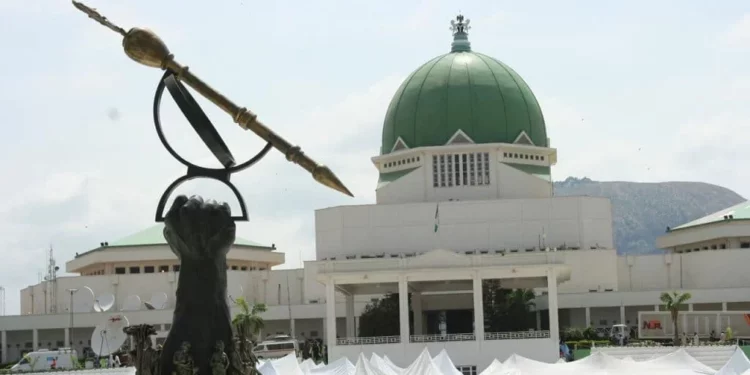As the National Assembly reconvenes Tuesday 24, August, following its annual recess, Senate Leader Opeyemi Bamidele announced on Monday that both chambers are looking forward to President Bola Tinubu’s presentation of the 2025 budget alongside the new Medium Term Expenditure Framework and Fiscal Strategy Paper.
According The PUNCH, in a statement he personally signed, Bamidele emphasized the importance of the MTEF, stating, “The consideration of MTEF occupies a prime place on the rung of our legislative agenda. This is simply because MTEF must be ready before the 2025 Appropriation Bill can be laid before the National Assembly.”
The MTEF serves as a vital legal framework that outlines the budgetary process, typically submitted to Parliament before the President presents the yearly budget to lawmakers.
Both the Senate and the House of Representatives had embarked on their annual recess on July 17 and are now set to resume their plenary activities.
In his statement, Bamidele also highlighted ongoing efforts regarding the review of the 1999 Constitution, which has been a continuous agenda since the inauguration of the committee.
He noted, “We are equally preoccupied with the review of the 1999 Constitution. In the Senate, the Constitution Review Committee is chaired by the Deputy President of the Senate, Senator Jibrin Barau.”
Bamidele outlined plans for the committee to hold retreats, strategy sessions, and call for memoranda, as well as organize zonal meetings to address sections of the Constitution that may require amendments.
He expressed confidence that the expertise of the committee members would contribute to a federative approach that would significantly redefine public governance in Nigeria.
In addition to these legislative priorities, Bamidele mentioned the establishment of a joint committee to investigate the alarming issue of oil theft.
Previously, the Senate’s ad hoc committee had operated independently from the House of Representatives, but a more coordinated approach is now planned.
He stated, “As we return fully to the parliamentary sessions on Tuesday this week, the National Assembly will, without ambiguity, revisit its decision to decisively address challenges in the petroleum industry.”
He elaborated on the various issues facing the sector, including crude oil theft, ongoing maintenance of public refineries, and the importation of substandard petroleum products.
Bamidele clarified, “Contrary to some media reports, the Senate never suspended its Ad Hoc Committee to Investigate Alleged Economic Sabotage in the Nigerian Petroleum Industry, but postponed its public hearing due to the need to address issues that border on the Rules of the National Assembly.”
He assured that both chambers would work together to resolve the outstanding issues and form a joint committee to continue the investigation initiated by the ad hoc committee.
Bamidele reaffirmed their commitment to uncovering the roots of economic sabotage in the petroleum sector to develop mechanisms for enhancing the industry’s efficiency and functionality.
The Senate Leader’s comments were echoed by the spokesman for the House of Representatives, Akin Rotimi, who outlined the key agenda for the House as it resumes.
He mentioned the anticipation of the 2025 Appropriation Bill, the ongoing constitutional review, and necessary electoral reforms.
Rotimi remarked, “With the 2024 fiscal year coming to a close, the House eagerly anticipates receiving the 2025 Appropriation bill soon. Timely submission from the executive is crucial, as it facilitates thorough scrutiny and public input through town hall meetings, a practice pioneered by the House during the 2024 budget review.”
Rotimi emphasized the House’s commitment to maintaining the January-December budget cycle and expressed hope for cooperation from the executive branch in this regard.
He also highlighted the House’s dedication to addressing pressing national issues, including recent flooding in Maiduguri, the ongoing insecurity, and the economic challenges facing the country.
“Honourable members will actively debate and pursue legislative action on pressing challenges faced by Nigerians,” he stated.
Moreover, he noted that proposed legislation captured in the legislative agenda would receive prompt attention due to their significance in promoting good governance.
“Bills and motions aligned with our commitments in the legislative agenda will receive prioritisation and fast-tracking,” he added, reflecting on how these legislative efforts will be assessed by Nigerians at the upcoming mid-term review in June 2025.
Lastly, the importance of amending the 1999 Constitution was highlighted, with Rotimi stating, “The constitutional review process serves as the bedrock of our democracy, embodying our collective aspirations for a just society. The House reaffirms the December 2025 deadline to arrive at definitive outcomes for the Sixth Alteration to the 1999 Constitution (as amended).”
The House Committee on Constitution Review, led by Deputy Speaker Benjamin Kalu, will ramp up efforts to address significant public concerns, having already received “about 305 memoranda from the public and about 150 constitution alteration bills from honourable members.” Rotimi assured that these bills would receive expedited consideration.













